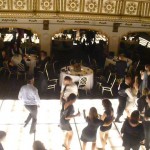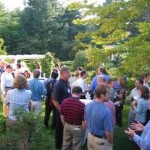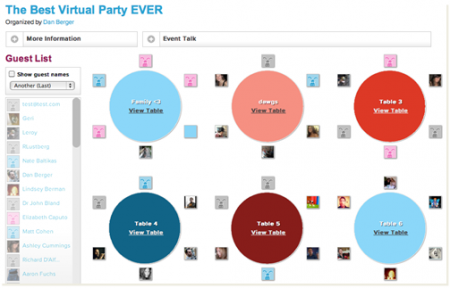Awkward, uncomfortable conversations waste a lot of time. Hi, how are you? So what do you do? Nice weather today, huh? Oh yeah, baseball, terrible season.
Social Tables, a website launched by DC-based co-founders Dan Berger and Matt Tendler, has come on the scene with the intent of banishing those meaningless conversations in favor of something a little more personal.
A cloud-based seating tool at its core, Social Tables offers an interesting twist on the standard seating chart by ramping it up with some social networking. Once the guest list is uploaded and everyone is ‘seated’ (which is to say, dragged and dropped into their chairs onscreen)the host has the option of “socializing” their event. Socializing the event will send an email to each guest with a link to preview who is sitting where. It will urge the guests to log in and complete a profile, but it’s free and the profile steps are simple and created with game-mechanics to keep us moving through — you even win little badges along the way.
The idea here is that guests will scope out other guests and maybe even start chatting — there’s a chat board for specific tables and for the event at large. In order to chat, guests will have to log in, building a database of events and users. Gone are the stilted conversations about the crazy weather we’ve been having and the obligatory small talk queries. You now have an opportunity to get that out of the way online and make a deeper connection in person. Additionally — if you didn’t get a chance to talk to someone you really wanted to talk to, or you perhaps you misplaced their business card, you can follow up with them through Social Tables and save yourself the teeth gnashing of regret.
Techli had a chance to speak with Berger about what they’re doing to promote bringing social networking to the event planning process. Two words: “guerilla marketing.” They brought on 3 interns for the summer and one of them is focused solely on social networking. Currently targeting the wedding market (for starters), on a small scale they watch Twitter and Facebook feeds for keywords to see who is recently engaged, who’s planning a wedding, who’s lamenting the seating chart and then get in touch with them. And if you don’t believe people are publically lamenting the seating chart, just check out some Twitter screen grabs on the Social Tables blog. Glad I’m not planning with the dude sporting the charming hashtag #dontevergetmarriedguys.

On the larger scale Social Tables has infiltrated wedding events like the infamous “Running of the Brides” in NY and set up several meetings with wedding planning heavyweights like The Knot and Wedding Wire. Acceptance by sites like these, as well as by professional wedding planners, is going to be a key component to their success in the wedding market. Berger joked that “our main competition is Post-It,” but he’s not kidding. When I planned my own wedding’s seating chart just 9 months ago, my tools were a poster board, a coffee cup for tracing and many-colored Post-Its. Effective, if not exactly high tech.
Given my recent experience as the bride-to-be, I’m not sure I’d be one of those people to ‘socialize’ their event. The last thing I needed when figuring the seating 3 weeks before the Big Day would’ve been the notoriously complaining cousin requesting alternate seating because she sees she’s too close to the DJ or too far from the bar. However, I could have also only provided the viewing invite to those mixed tables of his-and-hers friends who would’ve benefitted more from the preview.
That being said, I do think Social Tables would be a fantastic tool for professional networking events. Dinners, outings, awards, meet-and-greet events — their purpose is to seek out new opportunities, renew old relationships and create new ones: network. My day job is in the construction industry and between the architects, developers, contractors, unions, and groups like the Federated Women Contractors of America, there are so many events. The ability to do some recon beforehand on the who’s who of attendees or even virtually introduce oneself frees up valuable face time.

There seem to be plenty of less traditional uses as well. As Berger put it, “it’s a social meeting ground for anything that can be compartmentalized. If it can be mapped, it can be socialized.” The most unique use they’ve seen is a bocce league setting up games as events and introducing the two teams, re: tables, to each other.
Social Tables is building on some new ideas, as well. It recently brought in a third partner for mobile development.
As a seating tool, simply being cloud-based (and accessible everywhere) currently makes Social Tables the best alternative to the Post-It in this increasingly digital age. It’s the socializing tool to end the awkward conversation and “turn one-time events into lifetime experiences”.










